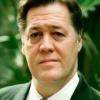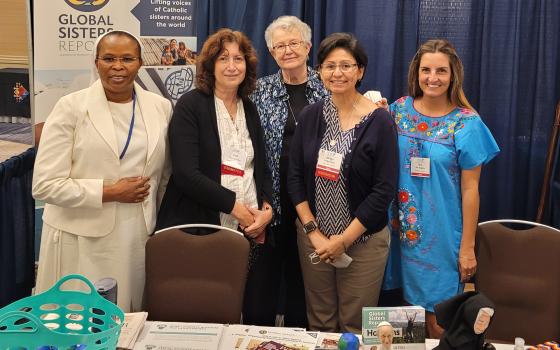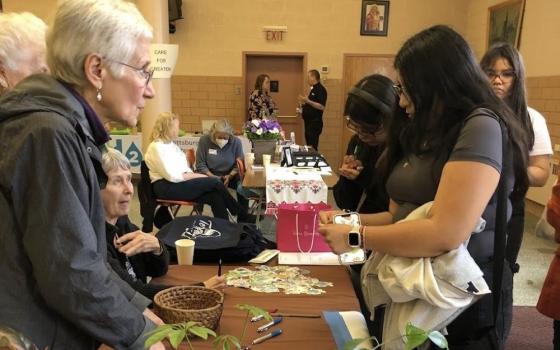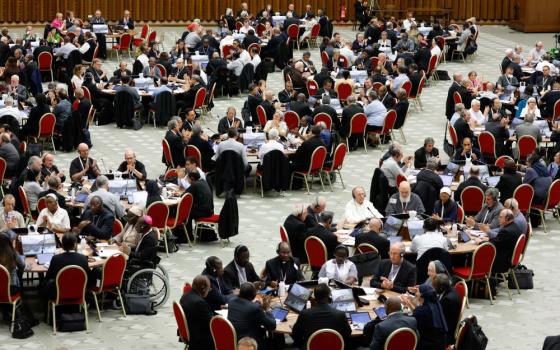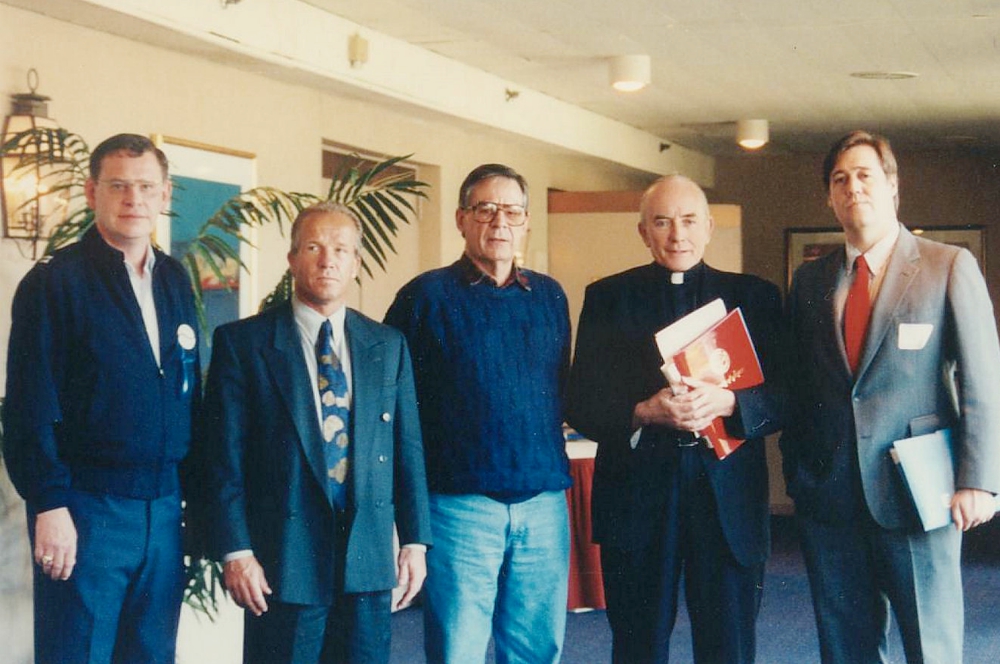
From left: Dominican Fr. Tom Doyle, attorney Jeff Anderson, Richard Sipe, Fr. Andrew Greeley and Jason Berry in a Chicago-area hotel in October 1992 for the first national meeting of survivors of clergy sex abuse (Courtesy of Fr. Tom Doyle)
The Roman Catholic Church offers no warm-hearted welcome to seekers of radical reform — radical, from the Latin, radix, meaning roots, or first things.
The Counter Reformation tried to surmount the worst allegations of Martin Luther's 95 theses nailed to a church door in Wittenberg, Germany, in 1517. Luther was outraged at clergy trafficking in indulgences (salvation for sale) and sexual hypocrisies of a gilded papacy.
"My friends, welcome to Wittenberg," said an open-armed Richard Sipe in 1992 at a milestone gathering in Chicago for abuse survivors.
The speakers included key figures in media coverage to come — Dominican Fr. Tom Doyle; attorney Jeff Anderson; Barbara Blaine, founder of the Survivors Network of those Abused by Priests; Chicago priest-sociologist Andrew Greeley; Sipe; and me, among others.
In Chicago Sun-Times op-ed pieces, Greeley had become a scourge of bishops for sheltering abusers. Sipe alone, I believe, felt vindication that day. A former Benedictine monk and a psychotherapist, he had a clinician's detachment on the sexual behavior patterns he had found in counseling hundreds of priests. Yet, the professorial Sipe, who died Aug. 8 at age 85, had his share of outrage, and the radical conviction that a broken clerical culture could only be restored when bishops confronted the truth.
His speech drew an analytical thread from Luther to the survivors' witness in forcing bishops to reckon with their concealment of sex offenders.
Sipe became a major voice in the media narrative that gained momentum a decade later with The Boston Globe series, and continuing coverage that stained the papacies of John Paul II and Benedict XVI, and finds Pope Francis confronting a Chilean hierarchy honeycombed in deceit and a Vatican tradition of soft-glove treatment of predatory bishops, like the latest specimen, Theodore McCarrick.
In The March of Folly: From Troy to Vietnam, which has an absorbing chapter called "The Renaissance Popes Provoke the Protestant Secession," Barbara Tuchman defines folly as the "pursuit of policy contrary to self-interest" of the governed. Clerical celibacy was that policy for Aquinas Walter Richard Sipe, whose obsession sent him from the margins of church scholarship to celebrity status, as the voice on the phone in "Spotlight," giving leads to Globe reporters.
He is the subject of a forthcoming documentary, "Sipe: Sex, Lies, and the Priesthood," directed by Joe Cultrera, whose earlier film "Hand of God" aired on PBS' "Frontline." Terence McKiernan and BishopAccountability.org are producing the film.
"The McCarrick case confirmed Sipe's warnings about the generational nature of abuse in seminaries — places where mindful celibacy could be taught, but instead became the site where abuse was often normalized and perpetuated by superiors," McKiernan told NCR. "He explored the strategies that perpetrators and enablers used to avoid and conceal the truth."
Clash of brilliant personalities
After leaving the priesthood in 1970, Sipe married Marianne Benkert, a psychiatrist and former religious sister. They eventually settled in coastal La Jolla, California; their son, Walter, became a physician and, like his father, is now an expert witness testifying for victims suing the church.
Dick Sipe, as I knew him when they lived in Baltimore in the 1980s, was a cerebral therapist who insisted that "the celibate sexual system" expected priests to be chaste, but failed to train them to do so. He was a terrific source. Drawing on some 1,500 case studies amassed over the years, Sipe concluded that no more than half of priests at any given time were leading genuine celibate lives.
That was one provocative finding in his landmark 1990 book, A Secret World: Sexuality and the Search for Celibacy, which Greeley savaged in a Philadelphia Inquirer review.
An authority on survey polling, Greeley scorned Sipe's methodology, extrapolating data — 6 percent of priests had had sexual contact with minors; at least a third were homosexuals — from clerics in therapy. Not a random probability sample.
Sipe and Greeley resented each other for years. Unbeknownst to them, each man read chapter drafts as I worked on my 1992 book Lead Us Not Into Temptation. Alert to their feud, my secret was not letting either one know that both were helping me. Today, I see that clash of brilliant personalities as one metaphor of a conflicted church internal.
I met Sipe in Washington, D.C., in 1987, after the funeral Mass for Fr. Michael Peterson, 44, a psychiatrist and founder of the clergy treatment hospital St. Luke Institute in suburban Suitland, Maryland. Peterson was an exceptionally learned psychiatrist, an emergency politician for the church, helping bishops find a place for priests with criminal pathologies, among alcoholics and others with conventional burnout.
I'd met Peterson at a conference in Baltimore where he had shared striking insights on sexual behavior patterns in the priesthood. When illness forced his retirement, I suspected he had AIDS, but didn't press the issue as Peterson, coughing on the phone, gave me leads in his final months about dioceses with buried scandals. Were those disclosures an alternate way to come clean about his own life?
The Washington archdiocesan announcement that Peterson had died of AIDS preceded a nonjudgmental, celebratory service at St. Matthew Cathedral to sympathetic media coverage — a human church. Sipe, a board member of St. Luke, had insisted that Peterson's diagnosis be made public to preserve the institute's credibility.
That day, Sipe gave me documents and leads on how Peterson was ousted from a previous clerical facility, outside Boston, for drinking and overcontrolling behavior. Peterson, as Doyle said later, was "a classic wounded healer."
Sipe was ever sensitive to the survivors, but his fixation was on the clerical culture, whose secrets he reported without sensationalism in A Secret World and later books. He wanted radical reform of the clerical culture. I had several meals at the Sipes' house in a Baltimore suburb, enjoying new friends.
Sipe was ever sensitive to the survivors, but his fixation was on the clerical culture, whose secrets he reported without sensationalism in A Secret World and later books.
In working on my book, I was struck by one of Greeley's articles, protesting the culture of gay priests, a topic that also vexed University of Notre Dame theologian Fr. Richard McBrien. In a Commonweal piece, McBrien stockpiled question after unanswered question on the scope and meaning of the gay priest culture.
As lawsuits escalated in the late 1980s, most of the victims willing to talk had been abused as teenage boys, not prepubescent children — the targets of pedophiles. To write about this, one had to reckon with the gay priest movement, a doubly difficult task given the homophobia in society and dark specter of the AIDS epidemic, at this time before the life-saving drugs.
Sipe insisted that homosexuality, as a normal sexual orientation, stood apart from "ephebophilia," which meant adults who abused teenagers. He viewed the delayed psychosexual maturity that drove some priests to prey on adolescents as a symptom of seminary training, flawed at best, warped at worst.
In that, he was well ahead of Greeley and McBrien, prominent intellectuals, products of seminaries of rigid Irish discipline who struggled to understand a gay movement in clerical culture that blindsided them.
I contacted Greeley after reading one of his pieces. Before email, we had several conversations by phone. In exchanging letters, he offered to read my work in progress (which Sipe was already reading). My previous book was a history of rhythm and blues. I was on such strange terrain with this one that Greeley's offer intimidated me. What if he hated it? Taking the risk, I sent it to Chicago. I was elated when he read it quickly, and offered to write an introduction, which proved a great help in landing a contract.
We met over breakfast in Chicago in 1990. Greeley had a quicksilver mind. I asked if he thought my delineation of predatory clerics and gay priests ran the risk of being criticized for homophobia. "Just keep making the distinction, over and over," he said.
What should the church do about gay priests? He looked up from his bowl of raspberries. "I have no idea."
Mindful of his attack on A Secret World, I mentioned how hard it was to find reliable data and, gingerly, mentioned Sipe's book. That triggered a mini-discourse on faulty data. Greeley's eyes flared: "He also questioned my celibacy!"
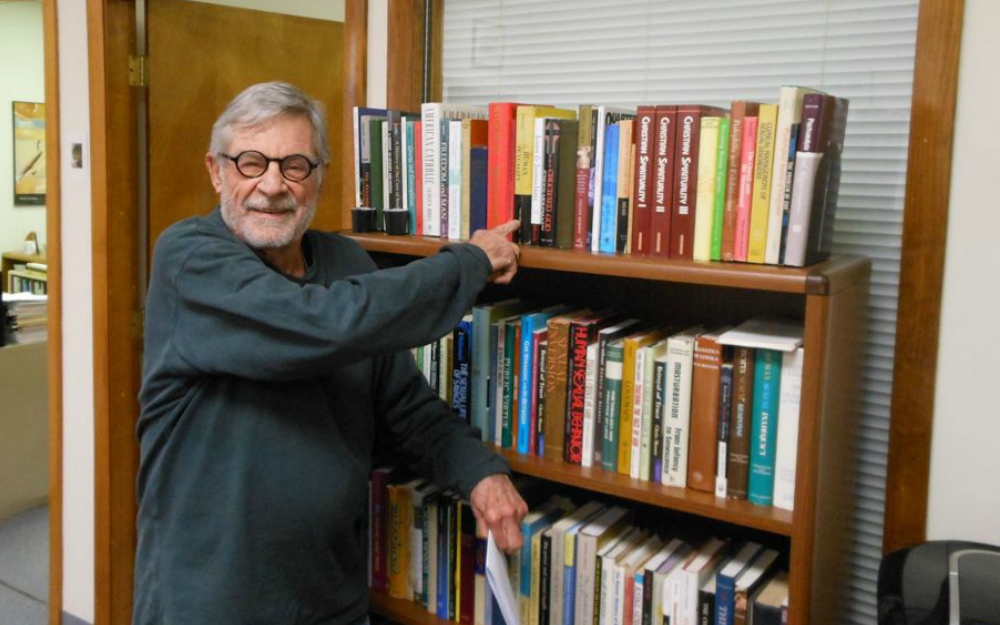
Richard Sipe in the offices of BishopAccountability.org points to a collect of his books that he gave to the church watchdog organization. (Courtesy of Fr. Tom Doyle)
Sipe got under Greeley's skin with a phrase Sipe had found seminarians using in the 1980s and wrote about in A Secret World. Sipe used examples from Greeley's early novels, like The Cardinal Sins (1981) and Thy Brother's Wife (1982), to illustrate what he had labeled "The Prove-Myself Experience," in which a priest has a relationship with a woman that either helps him grow up or leads to a rededication to his vocation. "The woman is essentially a tool of his growth or salvation. She is used," Sipe wrote.
Sipe then added that he had found seminarians had coined a phrase, "The Greeley Syndrome," which meant that one needed "to have sex with a woman, be conflicted, and then reject her ... [to] get back to celibacy and be a bishop."
Although critics wondered how a priest could write about sex in his novels, Greeley had never been touched by scandal. A workaholic who wore the collar in public and said Mass often, Greeley was proud of being a priest, even as he attacked bishops in print. Sipe attacked the celibate culture as systemically flawed.
To my knowledge, they met once, at the 1992 survivors' conference, for a group photograph. An overly courteous Sipe called him "Father." Greeley gave a terse, polite nod, and left after the photograph.
In 1993, Greeley wrote a piece in America that used available data from the Chicago Archdiocese on priests accused of sexual abuse to extrapolate a national figure of 5 percent of American clergy having been sexually abusive, and 100,000 victims — striking figures for religion reporters. Sipe had estimated 6 percent, which put them close.
I kept in touch with both men while moving on to a documentary project on jazz funerals. The Sipes left Baltimore for sunnier La Jolla. I noticed that lawyers were calling him "Richard." As he became more prominent in the press, Sipe took on lucrative expert witness work.
When I published a piece that cited Greeley's data from America, Sipe sent an email, complaining that his 1990 data should have been my source. Journalists typically seek fresh figures, updated findings in any field, as I explained in a return note — Greeley's estimate was more recent, I would cite Sipe's in the future, I told him. He fired back a testy objection. I did not respond.
Our friendship cooled over the next few years, but we caught up again over dinner at a survivors' conference in Lexington, Kentucky, in 2003, amid the tsunami of coverage driven by the Globe series.
At that dinner, Sipe confided to me that he had spoken with priests who had "partied" with a prelate who had enjoyed a high public profile before his death. Sipe had shared this information with "others in the media," and thus couldn't refer me to the accusing priests. He seemed confident that the story would come out — but it never did.
Advertisement
Over the years of speaking to abuse victims and counseling priests and former priests, Sipe had gathered a great deal of information about many clerics, some in high places. As he gathered new material in his years as an expert witness, he became a more valuable source to journalists. Some things he posted to the website he maintained, which over the years had multiple iterations but was commonly called the Sipe Report. We know now that he said he wrote at least twice to Pope Benedict XVI about the behavior of the now-demoted former cardinal McCarrick. He has said he wrote the pope about others, too.
That night in Lexington, I challenged Sipe. Suppose, I said, the hierarch in question had been sexually active at some point — with adults: What difference did it make? Sipe insisted it showed a deeper pattern of deceit in celibate culture, which was a central theme of his life's work.
It was his Wittenberg.
Some time later, on assignment in Los Angeles, I visited Richard and Marianne at their home in La Jolla, filled with religious art, and enjoyed their company again. Sipe was in midst of reading voluminous testimonies on the victim lawsuits underway in that archdiocese, and he was drawing a bead on Cardinal Roger Mahony's astonishing record of duplicity, more grist for his thematic mill.
A parting shot at Greeley
Sipe, like Greeley, had a problem letting go of old beefs. After Greeley's death in 2013, Sipe took to the Sipe Report to praise Greeley's writing on several fronts, but took a parting shot at him:
He expounded on the sacramentality of sex and the gender of God. He was not shy and revealed his own sexual fantasies in the context of his priesthood. Nowhere, however, does Greeley ever come entirely to terms with his own sexual tension and anxiety. ... But one basic question remains an area of justifiable fascination: how does a man develop psychosexually without having any sexual experience?
One could take issue with Sipe's suggestion that Greeley's novels reveal his sexual fantasies. Who is to say what his tensions were? I never raised the issue with Richard in later years. I realized how hard Greeley's criticism had hit him. But to Sipe's last question, a counter-question is obvious: Are the many priests who lead mature, responsible lives flawed by lacking, to whatever degree, in sexual experience?
All that said, it was a privilege for me to have known Richard Sipe. His analysis of a hierarchy using power to hide sexual behavior is a major achievement that church scholars — particularly theologians — will grapple with in generations to come. Pope Francis is doing so now like a man in a cave, seeking true light.
[Jason Berry has written three books on the church crisis, and is author of City of a Million Dreams: A History of New Orleans at Year 300, forthcoming in November.]




